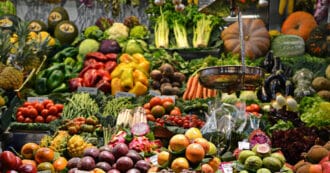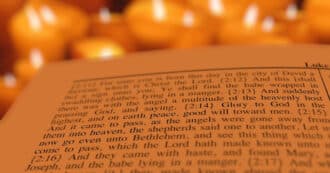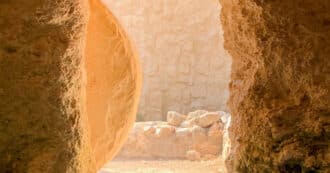The Rev. Dr. Leah D. Schade; leahschade@gmail.com
EcoPreacher 1-2-3 sermon helps for preaching Numbers 11:4-35 using a green lens.
Numbers 11:4-35 is one of the readings for the Eighteenth Sunday after Pentecost in Year A of Revised Common Lectionary, Sept. 28, 2025. The reading is abridged in the RCL to Numbers 11:4-6, 10-16, 24-29. However, I recommend that the missing verses and the rest of the chapter be read both in sermon preparation and in the worship service to hear the full story.
Focus on Numbers 11:4
“The rabble among them had a strong craving; and the Israelites also wept again, and said, ‘If only we had meat to eat!’”
Eco-Exegesis
Eco-exegesis is a method of interpreting the biblical text through a green lens using the principles of ecological theology. For this passage, we turn to Eco Bible, a Jewish ecological commentary on the Hebrew texts.
This story of insatiable appetites occurs after the Israelites have been liberated from Egypt and during the time they wandered in the wilderness. The word “rabble” in Hebrew indicates that this was a collection of people up to no good. They were instigators. This was a ravenous mob who super-charged and amplified the sin of gluttony – desire without limits. They convinced the people that God’s miraculous manna in the desert was not enough. They wanted more, to the point that they would rather go back to living as slaves just to get a few morsels from their Egyptian slaveowners. Egypt’s culture of sinful overconsumption followed them into the wilderness.
God responds by sending them more quail than they could ever eat, yet still they are not satisfied (v. 18, 31-32). According to authors of Eco Bible, “Today, we would call it insatiable consumerism. The Bible tells us that the Israelites collected enormous quantities of quail—more than they could ever consume, decimating the birds. A desire that can never be satisfied consumes resources to the point of destruction.”i A good question to ask here is “How do we as Christians steward the non-renewable resources that God gives us?”
At the end of the chapter (vv. 33-34), just as they are biting into the quail meat, those who succumbed to the “craving” died instantly of a plague. The place where they were buried was called Kivrot Ha-ta’avah, Hebrew for “the Graves of Appetite.” Dr. Jon Greenberg explains that to indulge gluttonously without acknowledging the Creator or the limits of creation was an expression of contempt for all that God had done for them. Such behavior leads to disaster.ii
Interestingly, the story indicates there are other voices who prophesied on behalf of God – Eldad and Medad. They are what we might call the “minority report.” Eldad and Medad are the dissenting voices who are neither part of the seething mob nor part of the seventy elders gathered around Moses at the tent of meeting. They stayed in the camp with the people trying to quell the ravenous appetites of their people. But some of the leaders tried to silence their voices because they were not “officially authorized.”
Yet Moses reprimands the snitches and those who jealously guard their power to speak on behalf of God. “‘Would that all the Lord’s people were prophets, and that the Lord would put his spirit on them!’” he says (v. 29).
1. Eco-Idea
The Eco-Idea is one succinct statement that tells us who God is and/or what God does in relation to Creation and how we should respond as people of faith. The Eco-Idea for this sermon is:
God generously provides for our needs, but there are disastrous consequences for indulging our ravenous appetites. Therefore, we must listen to those who call us to humbly and prudently steward our limited resources to ensure a sustainable future for ourselves and our descendants.
2. Eco-Questions
Eco-Questions are what we can ask to help a congregation draw out the implications of the Eco-Exegesis and Eco-Idea.
- The daily consumption of meat was shown to have dire consequences in this story from Numbers. Today, the meat industry requires vast amounts of water and land compared to what is needed to grow grain, beans, fruits, and vegetables. In addition, meat production emits more than 15 times the quantity of carbon dioxide to the atmosphere compared to vegetable production. Eco Bible asks: “How does God view Western meat-eating practices that consume tremendous resources while hundreds of millions of people worldwide face acute hunger?” What are ways we can cut back on meat and eat plant-based proteins instead? Can we try Meatless Mondays? How about a “Meat Tithe” – cutting back our meat consumption by 10%? Can we experiment with refraining from eating meat for a week as a holy discipline?
- If the advertising industry is like the ravenous instigators in Numbers who super-charged the appetites of the people, who are the Eldads and Medads among us today? Who is prophesying among our “camps” urging us to live sustainably in accordance with God’s provisions? Black-led, Indigenous, and food worker justice organizations can help reshape our relationship between food and faith. How can we connect with them?
3. Eco-Actions
Eco-Actions are ways that a congregation might respond to the Eco-Idea and Eco-Questions. One of these possibilities may have salience for your preaching context.
- With your youth group or adult forum, visit FoodPrint.org to connect with resources and organizations who advocate for Black, Indigenous, and food worker justice. Take their fun “FoodPrint Quiz” to get a baseline on the impact of your food choices and get tips for reducing the harm that goes into your food.
- Covenant together as a congregation or small group to choose one food justice action a month over the course of a year. Engage in ongoing reflection about how these choices impact your faith.
- Have a Meatless Potluck! Invite people to bring their favorite meat-free dishes. Set up a table with samples of meatless products like chickenless nuggets, plant-based burgers, and fishless filets. Have a meat-free cook-out and let people taste-test different kinds of meatless burgers to vote on their favorites.
EcoPreacher 1-2-3 is a Creation-centered preaching resource for busy pastors. Drawing from Eco Bible, a Jewish ecological commentary on the Hebrew Scriptures, the Rev. Dr. Leah Schade, author of Creation-Crisis Preaching: Ecology, Theology and the Pulpit (Chalice Press, 2015), provides sermon preparation for preaching about caring for God’s Creation that is short, accessible, and based on a solid biblical foundation. Thanks to the Interfaith Center for Sustainable Development for supporting this work.
i Eco Bible: Volume Two: An Ecological Commentary on Leviticus, Numbers, and Deuteronomy, by Rabbi Yonatan Neril and Rabbi Leo Dee, The Interfaith Center for Sustainable Development, 2021. Forthcoming.
ii Eco Bible: Volume Two. Adapted from content produced by Canfei Nesharim, a branch of Grow Torah. Original article available at https://www.growtorah.org/bamidbar/2022/06/17-behaalotcha-balancing-natural-forces.
iii “Food’s Carbon Footprint,” Green Eatz, accessed February 18, 2019, http://www.greeneatz.com/foods-carbon-footprint.html.
iv Eco Bible, ibid.
* Featured image source





